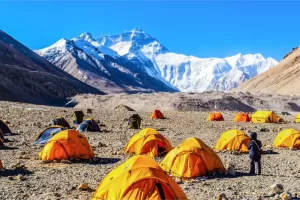What is Mountain Sickness?
Medically Reviewed by Dr Aifric Boylan
Last updated on 11.06.2024
What is Mountain Sickness?
Mountain Sickness, also known as Altitude Sickness, is a condition you can develop if you usually live at low altitude and you climb to a higher altitude quickly.
What are the symptoms of Mountain Sickness?
Symptoms can vary from mild to severe and include:
- Mild headache
- Slight high temperature
- Nausea
- Decreased appetite
- Weakness
- Tiredness
- Dizziness
- Disrupted sleep
- Faster breathing, particularly if you exert yourself
- Heart palpitations/fast pulse
- Swollen ankle/hands
Symptoms that indicate serious illness (an emergency) include:
- Severe headache
- Vomiting
- Confusion/disorientation
- Strange behaviour
- Hallucinations
- Feeling unsteady on your feet
These symptoms can develop quickly, over just a few hours.
Why does Mountain Sickness happen?
- At higher altitudes the air pressure is lower.
- This means that less oxygen is transferred into your bloodstream from the air you breathe.
- If you ascend slowly your body can effectively adapt to these changes.
Who gets Mountain Sickness?
- People tend to develop symptoms within a day or two of arrival at altitude.
- Mountain Sickness is rare (though still possible) below 2500 metres above sea level.
- The higher you climb and the faster you climb, the higher the risk of developing symptoms.
- 20% of people climbing quickly to 2500 metres (8000ft) and 40% of people climbing quickly to 3000 metres (10,000ft) will develop Mountain Sickness (1).
- Physical fitness and age haven’t been shown to make any difference to the risk.
What should I do if I get symptoms of Mountain Sickness?
The advice is very clear:
- Don’t go any higher.
- If your symptoms are worsening:
- Go back down the mountain straight away.
- Get emergency medical attention.
- Get down to the altitude where you last felt well.
- If your symptoms are mild and not worsening, don’t ascend any further until they’ve resolved (which will usually occur within a day). Have a very low threshold for descending and getting emergency medical attention.
- Rest. Physical activity can make Mountain Sickness worse.
- There are specific medications that can be used to prevent Mountain Sickness- these should be discussed with your doctor before you travel.
- There are also particular steroid medications that can be prescribed to treat Mountain Sickness (2)
Can you die of Mountain Sickness?
- Yes.
- The symptoms described can progress to coma, seizures and death.
- Take it seriously. Descend the mountain if you’re in ANY doubt.
What measures can I take to prevent Mountain Sickness?
- Once you’re above 2500 metres (8000ft) ascend a maximum of 300 metres (1000ft) per day.
- Take preventive medications as prescribed by your doctor before your trip.
Further Patient Resources
Article Resources
Getting a Mental Health Care Plan in Australia: Your Guide
Getting a Mental Health Care Plan in Australia: Your Guide Mental health matters—and if you’re feeling overwhelmed, anxious, or down, a mental health care plan can help. But what is it, and how do [...]
UTI Symptoms and Treatment: What You Need to Know
UTI Symptoms and Treatment: What You Need to Know Urinary Tract Infections (UTIs) are common, uncomfortable, and often disruptive. But what exactly are the signs to watch for, and how can you get relief [...]
Free Mental Health Care Plan Online | Bulk-Billed by Qoctor
Free Mental Health Care Plan Online | Bulk-Billed by Qoctor Discover how to get a free, bulk-billed Mental Health Care Plan (MHCP) in Australia through Qoctor's telehealth service. Accessing [...]






